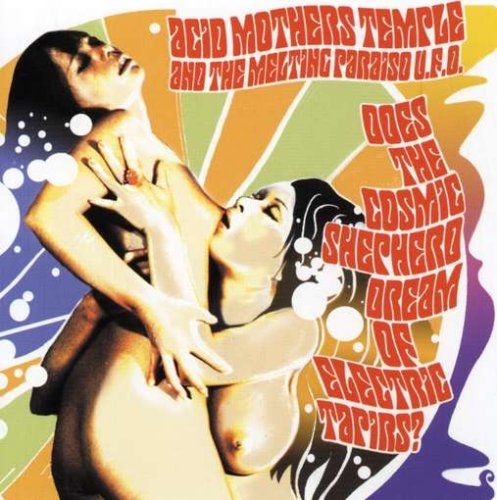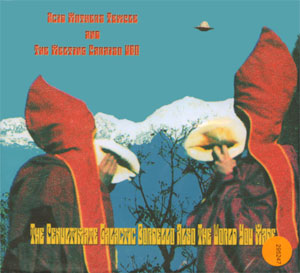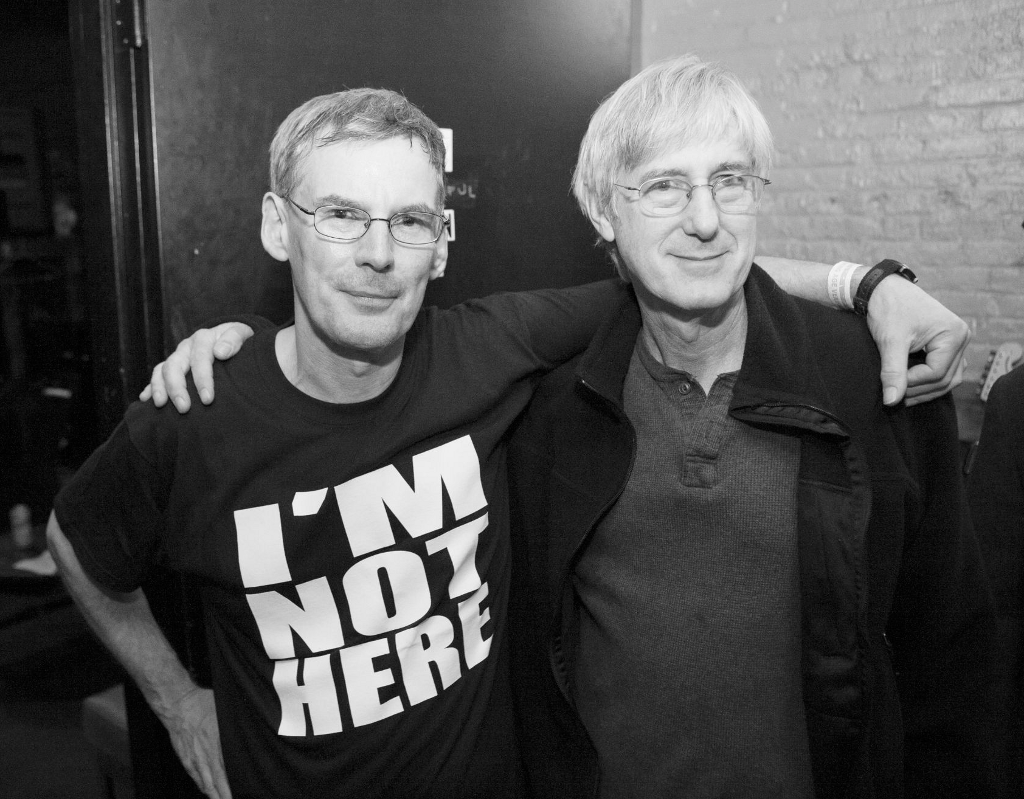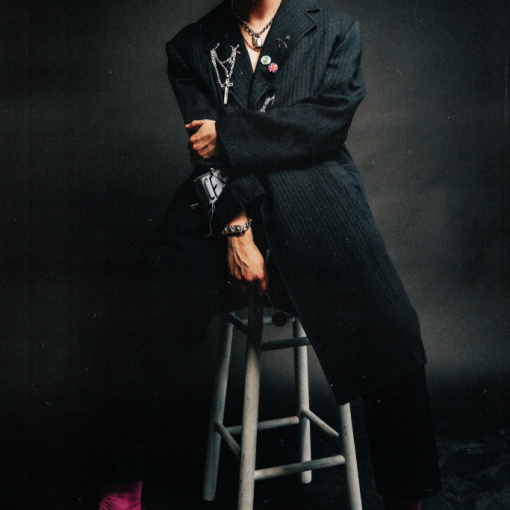– Does The Cosmic Shepherd Dream Of Electric Tapirs?
Label: Space Age Format: CD
– The Penultimate Glactic Bordello Also The World You Made
Label: Dirter Promotions Format: 4CD
 With a band as prolific and expansive as the Acid Mothers Temple, it’s somewhat difficult to select a “typical” release to settle on, and perhaps (perhaps not) Does The Cosmic Shepherd Dream Of Electric Tapirs? is as good as any as a starting point for the uninitiated. The album opens with a kosmische wind and wibbling analogue synths, mysterious voices from the aether and a sense of psychedelic foreboding, so the ingredients for a lengthy trip are there from the off. In fact, by the time “Daddy’s Bare Meat” kicks in to full Space Rock effect, it’s clear that the ride on Cosmic Shepherd is going to be far from easy, as a Free Rock spasm is soon engaged, the sound becoming drenched in lysergic howls and analogue squitters, drums clattering downstairs to the cellarfull of rambling bass growls.
With a band as prolific and expansive as the Acid Mothers Temple, it’s somewhat difficult to select a “typical” release to settle on, and perhaps (perhaps not) Does The Cosmic Shepherd Dream Of Electric Tapirs? is as good as any as a starting point for the uninitiated. The album opens with a kosmische wind and wibbling analogue synths, mysterious voices from the aether and a sense of psychedelic foreboding, so the ingredients for a lengthy trip are there from the off. In fact, by the time “Daddy’s Bare Meat” kicks in to full Space Rock effect, it’s clear that the ride on Cosmic Shepherd is going to be far from easy, as a Free Rock spasm is soon engaged, the sound becoming drenched in lysergic howls and analogue squitters, drums clattering downstairs to the cellarfull of rambling bass growls.
Dementia rules for a solid proportion of this disc, and as with their incendiary live shows (which can be astounding or overblown, sometimes simultaneously) it’s a madness which requires a sympathetic listener open to such states of being, because when there’s a headache in the offing or a little light snoozing to be done, Cosmic Shepherd is not going to provide the soundtrack of choice on a couple of tracks at least. Having said that, bizarre Doowop track “Suzie Sixteen” is actually pretty relaxing, as the Acid Mothers let their inner psychedelic Teddy Boy croon into the merest hint of overtone singing. Very odd, as is Cotton Casino‘s (keyboards, beer and cigarettes) hippytastic acoustic number “Hello Good Child”, which the rest of the band do their best to interrupt and make generally off the wall through judicious twanging interventions and background FX. The Sixties strum isn’t far from the heart of the rest of the group however, as bassist Tsuyama Atsushi‘s “The Assassin’s Beautiful Daughter” goes on to show, fitting at the intersection of Segovia, The Incredible String Band and fellow Japanese wigout merchants Ghost and veering off queasily into their own very particular pastoral territories.
The grandiloquent heritage of Amon Düül II ripples clearly from the heart of “Dark Star Blues”, much more so that the Grateful Dead influence which the title might indicate, as Casino’s vocals achieve Operatic intensities recalling Renate Knaup-Krotenschwanze‘s skyscraping notes on Yeti matching the fretwork wringing Kawabata Makoto extracts from his guitar. A shade over 25 minutes long, “Dark Star Blues” marks the centrepiece and highlight of an album which does what every freakout disc should do, and blows the cobwebs away with skull-shattering sounds to pulverise the grey matter into blissful submission, barely letting up for a moment and piling on the pressure until psychic boiling point is reached and feedback duly sighing out. The album signs off with nearly another twenty minutes of electronic Zen droning as the effects roll over each other to provide an extended glide down to back to terra firma in “The Transmigration Of Hop Heads”, a landing which is still quite unsettling and doesn’t end too smoothly either.
 As if the two long tracks on Does The Cosmic Shepherd Dream Of Electric Tapirs? weren’t monstrous enough, there are no less than four CDs making up The Penultimate Glactic Bordello Also The World You Made boxed set, each disc being no shorter than an hour long with just one track on each. Disc One is titled “The Beautiful Blue Ecstasy (Have You Seen The Blue Sky?)”, and opens with a cheery “Hello” before swooshing off immediately into a brightly-coloured eyes-wide-shut/brain-wide-open groove. With Makoto intoning highly fried lyrics into the mix at a level only audible to the lysergically enhanced, the Acid Mothers wibble away the next hour in heavy mood. The disc unfolds in classic AMT style: a bit like the Psychedelic Rock equivalent of sitting on one side of the railway while a mile-long train passes by, flicking off bits of synthesizer gold dust and demented effects pedal noises. With this much space to breathe and expand, the chug downhill into more gentle violin and synthesizer pastures follows what seemes like hours of phaser frenzy, but is more like forty minutes in reality.
As if the two long tracks on Does The Cosmic Shepherd Dream Of Electric Tapirs? weren’t monstrous enough, there are no less than four CDs making up The Penultimate Glactic Bordello Also The World You Made boxed set, each disc being no shorter than an hour long with just one track on each. Disc One is titled “The Beautiful Blue Ecstasy (Have You Seen The Blue Sky?)”, and opens with a cheery “Hello” before swooshing off immediately into a brightly-coloured eyes-wide-shut/brain-wide-open groove. With Makoto intoning highly fried lyrics into the mix at a level only audible to the lysergically enhanced, the Acid Mothers wibble away the next hour in heavy mood. The disc unfolds in classic AMT style: a bit like the Psychedelic Rock equivalent of sitting on one side of the railway while a mile-long train passes by, flicking off bits of synthesizer gold dust and demented effects pedal noises. With this much space to breathe and expand, the chug downhill into more gentle violin and synthesizer pastures follows what seemes like hours of phaser frenzy, but is more like forty minutes in reality.
Disc Two (“The Seven Stigmata From Pussycat Nebula”) mixes ominous riffing with a ponderous guitar in search of something to ingite, crawling through the analogue swirls with malice aforethought, eventually stumbling upong the root canal which leads straight to free rockout bliss. “Seven Stigmata…” is a more restrained (relatively at least) piece, gleeful passages of unearthly shriekings coruscating over the questing guitar as the band fiddle around each with other musically and almost incidentally with the listener’s by-now somewhat bruised psyche. This battery continues until Makoto and chums deploy a reedy ney assault, the trebly tones multi-tracked and echo-effected into a discordant blast of dementia-inducing proportions, while the synths flip out from the low end into the stratosphere. It’s a bit like being pummelled by the ghosts of numerous cats put in bags and left to argue amongst themselves as to who can wail the longest, provided said felines then rocked very hard having given up on the squealing and settling for monster guitar riffs once again. The remaining twenty minutes is taken up with a Syd Barratt-era Pink Floyd style race into space and subsequent splashdown into tapeloop disorientation.
Accompanied by a ribbon-draped antique painting of a penis on the sleeve, Disc Three, “What’s Your Name” continues the onward march of psychedelic misrule. Here the band pursue a stop-start theme with periodic questions to their various audiences and friends punctuating the freeform clatter which is delivered in a jazzier mode. Soon the question begins to be asked and answered in more and more bizarre ways, yelled, laughed and sung acapella, peppered with tinkly avant-piano flutters. There are amplifier-bashing guitar shenanigans, bells and glockenspiels, droned and shifted through more and more peculiar effects, with Atsushi providing the vocal gymnastics for the most part, while the random conversations and even songs from the respondents drift across the aether. The overall effect is actually even more disturbing than the discs of full-speed ahead rockouts, as the words are folded in on themselves and that ever-lurking mega-riff. Naturally enough, the conclusion is as epic and circular as might be expected, the sparks flying to the very last.
Finally (assuming that the box is being listened to in disc order), “The Holy Mountain In The Counter-Clock World” expands in somewhat relaxed, reflective mood by comparison, backwards loops, percussion and vocal drones slithering through echo boxes, bowed strings and analogue ripples and trills. The track ebbs and flows, gathering layers of harmonic drones around the mixed bag of sounds with somnolent, hypnagogic results, plateuing somewhere in the lower reaches of the Himalayas then swooning gently down into pastures of relaxed loops and hums in exemplary comedown style. After the punishingly energetic waves of gripping noise of the previous three discs, “Holy Mountain…” feels like the refreshingly cold bath stages of a psychic sauna, massaging the pulverised sensory receptors back to some semblance of normality.
It should probably be stressed that The Penultimate Glactic Bordello Also The World You Made is not going to really appeal that much to the casual listener – hardcore AMT fans will love it, as will those with the time to let themselves fall back into the lengthy explorations of just how far psychedelic music can be pushed. Everyone else is quite likely to run screaming from the intensity, so it is suggested that locking the doors and perhaps the application of padded restraint could aid the persuasive powers of this mammoth box set being exerted on those wary of being taken to the extremes of Japanese musical freakout mania. Daunting as it may be, this box is well worth the effort of a full-on listening session, which can at least be broken down into relatively easily digestible hour-long chunks. As with the extended DVD editions of the Lord Of The Rings, this sort of thing takes time to appreciate, but is ultimately a similarly immersive experience.
-Linus Tossio-



